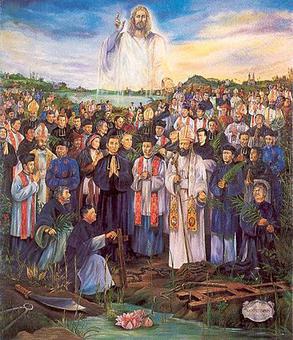
Overview
Matthew 10:35-38 - For I have come to set a man against his father, and a daughter against her mother, and a daughter-in-law against her mother-in-law; and a man's foes will be those of his own household. He who loves father or mother more than me is not worthy of me; and he who loves son or daughter more than me is not worthy of me; and he who does not take his cross and follow me is not worthy of me.
This is a passage that is probably one of the most difficult to understand. But we can easily find evidence of His word in the stories of the martyrs: many of them lost ties with their family, friends, neighbours, etc, even their own life. Following Christ means prioritising God over anything else.
Over the course of the history, many Vietnamese Catholics were jailed and tried for their faith. Many refused to give up their faith, and as a result, were executed. Estimates show that there are in total around 100,000 Catholics executed. 117 out of them were canonized as saints. [ref]
Historical Context
Pre-colonialism
Catholicism in Vietnam dated back all the way in 1500s. At the time, Vietnam was in a civil war, between the North and the South. Christianity was not really well-received among the Vietnamese people, partly because of the language barrier between the Western missionaries and the Vietnamese. [ref]
The North welcomed the evangelization, even allowed missionaries to preach in the palace. This was because the Northern lords wanted to establish a trade relation with the Portuguese. [ref]
Persecution of Catholics happened at the district level. At the time, the majority of Vietnamese followed folk religions, where polygamy was allowed, and worship of ancestors was a must. This contradicts the teaching of Christianity, which promotes monogamy and discourages one from bowing to ancestors. Many saw Christianity as a heresy.
In the 1700s, the country was reunited by king Nguyen Hue (reign name Quang Trung). His dynasty was considered one of strongest in Vietnam:
- Defended against the Siam invasion in the South.
- Defended against the Manchu invasion in the North.
Under his reign, he allowed Christianity to thrive. However, there were some exceptions: [ref]
- In 1785, Nguyen Nhac, Nguyen Hue's brother, ordered to plunder Catholic villages. The order was retracted shortly after.
- Nguyen Hue ordered the arrest 2 foreign priests due to political suspicions.
Nguyen Hue's son, Canh Thinh, after taking the throne upon his father's death, ordered the persecution of Catholics.
Threat of colonialism & French's attack
A new monarchy (Nguyen dynasty) was set up in 1802. The French somewhat helped Nguyen Anh (Gia Long) to gain control from Nguyen Hue. [ref] Gia Long was not fond of Catholicism, but had the obligation to keep Catholicism free in Vietnam. Before death, he cautioned against discrimination against Catholics, as that would cause social instability. The conflict with Catholicism mainly stemmed from polygamy practices at the time in Vietnam, but Catholicism enforces monogamy.
- Catholics must obtain permission to rebuild old churches
- Catholics were not allowed to build new churches.
Second king of the monarchy, Minh Mang, was fully against Catholicism and ordered persecution of Catholics. He was dubbed the "Nero of Vietnam" due to his aggressive policies towards Catholics. [ref]
- Did not believe in the existence of heaven
- Saw (Catholics) not bowing to ancestors as a serious crime.
His policies were more to force Catholics to give up their faith than to execute Catholics.
Third king of the monarchy, Thieu Tri, was more relaxed towards Catholicism. He gave into many French's demands to release Catholic prisoners. His views towards Catholics was: it was a vector of invasion from Western countries. He was afraid that, in a similar manner to the Chinese opium war, after giving into demands to release Catholic prisoners, they might follow with demands for free trade of opium.
Fourth king of the monarchy, Tu Duc, was the most aggressive towards Catholics, mainly due to the threat of colonialism. Catholics were seen as working for the French.
- Foreign priests were executed without trial
- Vietnamese Catholics were allowed to step over the cross to avoid execution
When the French attacked, some Catholics joined forces with the French, bolstering his claim that Catholics were working for the French. However, many Catholics signed up to join the Vietnamese military to fight against the French.
French battleships approached the shores of Da Nang in 1857, and war broke out in 1858. During this time (1857 - 1862), the Nguyen dynasty was the most active in hunting down and persecuting Vietnamese Catholics.
The end of persecution
French attacked Vietnam in 1858. In 1862, the king of Vietnam, Tu Duc, signed a peace treaty with France, officially acceding to France's rule on parts of Vietnam, allowing free trade, and allowing free practice of Catholicism. [ref]
Martyrs
(Paul) Le Van Loc
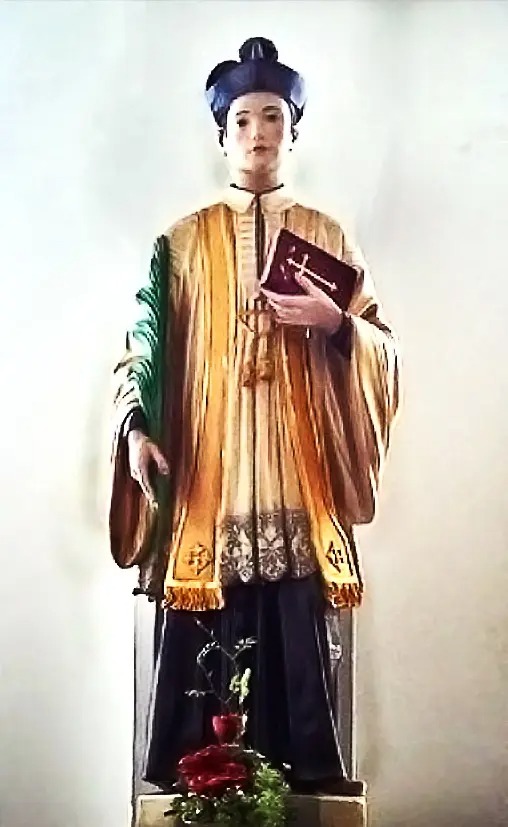
James 1:12 - Blessed is the man who endures trial, for when he has stood the test he will receive the crown of life which God has promised to those who love him. [ref]
Loc was born in 1830 in Gia Dinh, now called Saigon/Ho Chi Minh city. He was sent to seminary in Penang in 1843. He started teaching catechism in Saigon in 1850, and was finally ordained priest 1857.
In 1857, as French battleships approached the shores, king Tu Duc doubled down on the Catholics in Vietnam due to suspicion of conspiration with the French. The seminary he was in had to be disbanded due to social uncertainties. However, catechism still continued. He managed to gather around 200 new converts.
In 1858, while he was hiding in an ex-seminarian house, he was caught and imprisoned.
The French attacked Gia Dinh (Saigon) in 1859. The king's subordinates pressured the king to execute Loc. Without trial, Loc was beheaded.
(Augustine) Phan Viet Huy
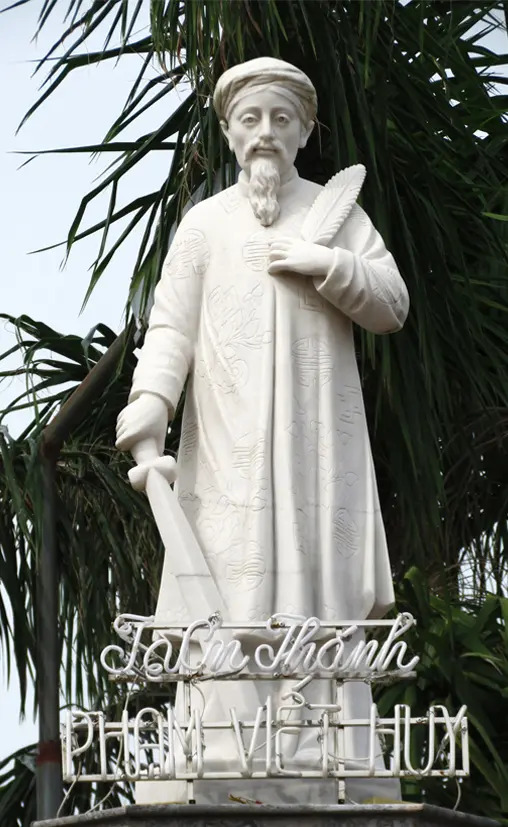
2 Corinthians 12:9-10 - but he said to me, "My grace is sufficient for you, for my power is made perfect in weakness." I will all the more gladly boast of my weaknesses, that the power of Christ may rest upon me. For the sake of Christ, then, I am content with weaknesses, insults, hardships, persecutions, and calamities; for when I am weak, then I am strong. [ref]
Huy was born 1795, Nam Dinh. He was enlisted in the military in 1830.
In 1839, the head of state in Nam Dinh ordered around 500 Catholic soldiers to step over the cross to declare that they give up their faith. Most of them did, except for 3, including him.
The head of state initially wanted to execute the 3 of them, however, king Minh Mang ordered him to try to force them to give up their faith instead.
The head of state threatened to persecute their villages, but still failed to force them to step over the cross. Not giving up, the head of state ordered to torture the elder of their village to guilt trip them. The 3 then gave in and stepped over the cross. The head of state gave them each some money as reward.
Huy repented, went back to the head of state to declare his faith to him, and returned the payment. The head of state ignored their profession, to avoid following another order from the king.
In summer 1839, when the king Minh Mang was visiting Nam Dinh, he declared his faith to the king. Finally, the king ordered his arrest and execution by hanging.
(Anton) Nguyen Tien Dich
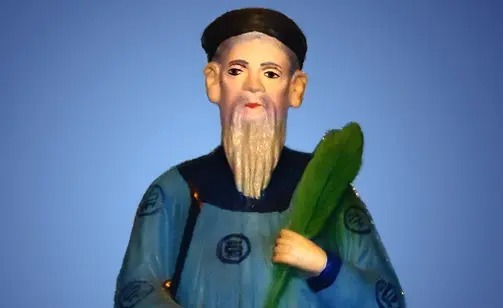
John 12:24 - Truly, truly, I say to you, unless a grain of wheat falls into the earth and dies, it remains alone; but if it dies, it bears much fruit. [ref]
Tien Dich was born in 1769 in Nam Dinh. He grew up to be the head of his Catholic village.
Tien Dich regularly helped others in hard times:
- When cholera spread in a nearby (Ke Vinh) seminary, he hired some doctors to treat the patients until full recovery, without charging the patients.
- During harsh times of persecution of Catholics, he sheltered some seminarians from (Vinh Tri) seminary for more than 2 years.
Tien Dich and Huy My, his son-in-law, were arrested for their faith in Christianity. Huy My offered the head of state to receive the penalties for Tien Dich, as Tien Dich at the time was old and frail.
The head of state agreed, offering Tien Dich to step over the cross to be pardoned, convincing him to spend his old age with his family. Tien Dich refused. The head of state then ordered him to be dragged over the cross, but he lifted his legs to not touch the cross. He was subsequently imprisoned.
In jail, whenever he received food from his family, he shared with his fellow inmates, regardless of religion. Tien Dich was executed in 1838 by beheading.
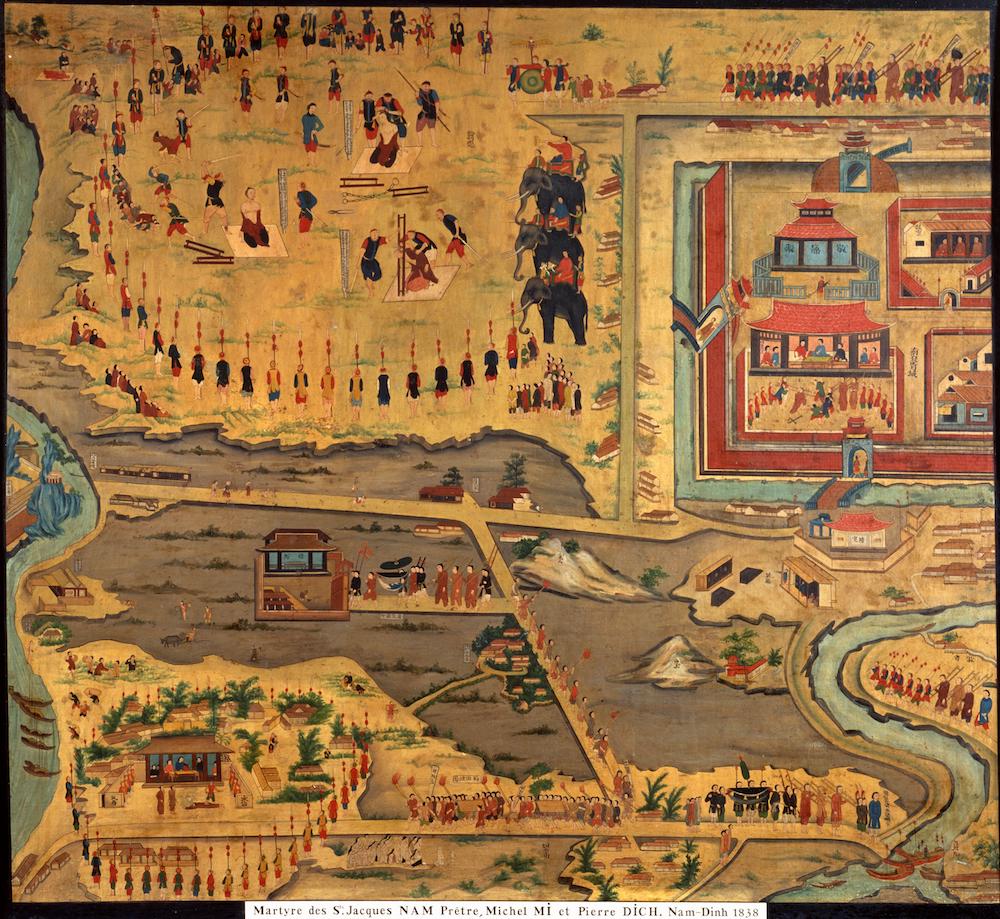
Execution of Michael Nguyen Huy My, Anton Nguyen Tien Dich, and James Do Mai Nam
(Andrew) Tran An Dung (Lac)
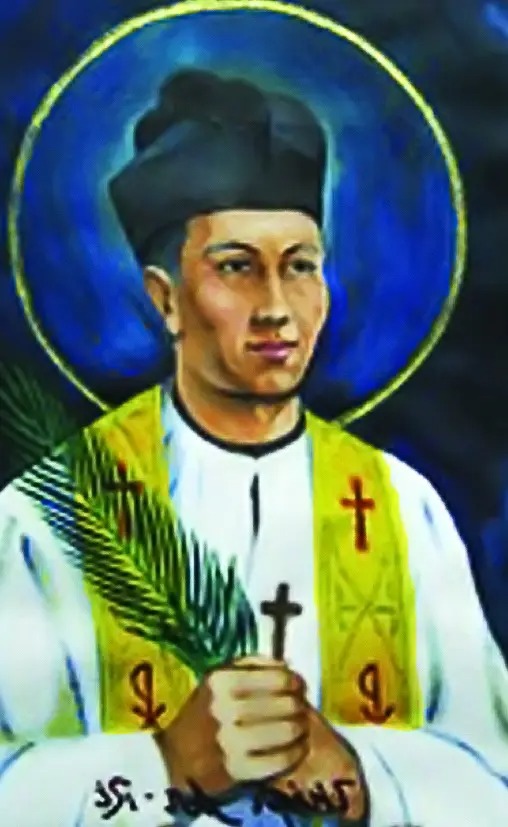
"This is the third time I am arrested, I shall follow God's will, do not bother paying ransom for me." [ref]
Dung was born in 1795 in Bac Ninh. He was considered smart as he managed to learn both (old) Vietnamese and Latin.
After 3 years of seminary, he was ordained priest in 1823. He regularly aided the poor and the disabled. In many occassions, he did not tag along his seminarians to avoid them being arrested. He was active throughout his ministry.
In 1835, Dung was arrested and tried in front of the head of state. A Catholic bribed the head of district for help with begging for Dung's release. The head of district then told the head of state that Dung was his uncle, and Dung was released. Dung Changed his name to "Lac" to change his identity and avoid being arrested again.
In 1839, Dung was arrested for the second time with another priest (father Thi) when they were holding confession for each other. Catholics bribed to get them released.
Again 1839, Dung was arrested the third time, together with father Thi. The head of district said, he did not want to arrest Lac, but people presented you to me, so he had no choice. Lac said, if he did not mean to arrest, then he should release him. The head of district said, people have known that Lac was a Catholic priest, he did not dare to do otherwise. This was hinting at bribes to ransom Lac out of prison.
A Catholic wanted to sell his fortune to afford his release. "If you become a martyr, you will go to heaven by yourself, but if you are still here, we Catholics can still rely on you." But Lac told them, "This is the third time I am arrested, I shall follow God's will, do not bother paying ransom for me."
Lac refused to step over the cross. Lac said, he would rather die the death of a thousand cut (a form of execution).
Lac and Thi prayed and did examinations of conscience in preparation. "Let's persevere through, so that we will soon see our Almighty Father."
They both received last Eucharist from another priest (father Tran). Lac was beheaded in 1839.
Modern time
20th century
1945 - 1954
In 1945, Ho Chi Minh declared Vietnam an independent state.
The French came back shortly after. Vietnam declared war on France in 1946. The war ended in 1954 with the Geneva accords, which split the country into 2 halves, both were to hold democratic elections to decide their own leader, with the communists governing the North.
Thadeus Le Huu Tu was appointed bishop in Ninh Binh in 1945, which received congratulations from Ho Chi Minh. Ho Chi Minh expressed his trust in Huu Tu that he would guide Catholics into contributing to the independence of Vietnam. His diocese became a place of shelter for many during the war. [ref]
On July 1, 1949, Communists in China took over the country. On July 13, 1949, pope Pius XII issued a papal decree, banning any collaboration between communists and Catholics, excommunicating Catholics that are in communist parties. He believed that communists in Vietnam are "little by little" showing their true colour of atheism, who would sooner or later carry out systematic persecution of Vietnamese Catholics. [ref] [ref]
On November 9, 1952, the bishops in Indochina issued a joint letter, where they warned Catholics of the lure of communists. At the core of communism is Marxism - Leninism, which views materials as humans' end goal, and hence is atheistic by its nature. While it puts in efforts to establish offices of governance for Catholics, those are nothing but to serve their purposes, possibly to identify and persecute Catholics. [ref]
During the war, the Catholic attitude towards the communists and French were mixed. Many supported the nationalist movement.
1954 - 1975
After the Geneva accord, Vietnam saw 300 days of peace, during which people could move across the border to choose their preferred side. Many Catholics migrated to the South.
The North Vietnamese government started focusing on internal affairs. In 1955, the North Vietnamese government issued a decree guaranteeing religious freedom, and prohibited any state interference with religious activities. [ref] This was one of their efforts to retain Catholics in the North.
Ngo Dinh Diem corrupted the election promised in the Geneva accord to set up his own dictatorship. The US supported Diem, and the North tried to regain control of the South, leading to the civil/American war. Initially, the US sent military advisors, weapons, and economic aid. It later escalated to sending troops in 1964.
- The South was the main front of battle, mainly via insurgence (guerilla) attacks. The North was heavily bombed by US planes.
- "Tet 1968" (Lunar New Year of 1968) marked the most significant event, where the North attempted a total attack on the South. While it was a tactical failure from the North, it was after this moment that the anti Vietnam war sentiment peaked in the US.
- 1973, the US attempted to bomb the North to totally destroy its infrastructure. However, many of the US' B52 aircrafts were shot down. The campaign was considered a disaster for the US. After the campaign, the US and North Vietnam signed the Paris accord, by which the US had to withdraw troops from the South.
- 1975, the country reunited under the communist rule.
The North Vietnamese government conducted collectivisation (land reform) in 1955 - 1956. Many rich land owners were imprisoned and executed. The communists made multiple false accusations, which were then corrected shortly after. [ref] [ref] While this brought about disasters for many Vietnamese (not just Catholics), this topic is barely mentioned in current history textbooks, at most it is skimmed through.
For Catholics, many churches, schools and seminaries were disbanded as a result. Many priests were imprisoned and executed. Seminarians did not have the right conditions to be educated. Many priests were ordained in secret. [ref]
1975 onwards
Upon reunification, the Vietnamese government implemented re-education camps, where those affiliated with the South Vietnamese government were jailed, to be "re-educated" about the communist and nationalist ideologies. Many prominent figures in the past South Vietnamese government and soldiers were sent to re-education camps.
Many churches were destroyed upon reunification. Religious schools were totally banned. Many then-Catholic schools were confiscated and reused by the government. The government also imposed strict controls of religious facilities and activities. [ref] This includes Catholic churches, nurseries, and the appointment of bishops.
The Vietnamese government interfered with many Catholic activities.
- In 1975, cardinal Francis Nguyen Van Thuan, archbishop of Saigon, was forced to resign from his position. He was subsequently forced into re-education camp, and then expelled from Vietnam in 1989. [ref]
- Many Catholics were detained and sent to re-education camps.
- In 1975, the Apostolic Delegate Henri Lemaitre in Vietnam was expelled from the country. [ref] Vietnam officially cut ties with the Vatican.
- In 1988, pope John Paul II canonized 117 Vietnamese martyrs as saints. The Vietnamese government accused the Vatican of canonizing those martyrs with political motives, claiming that those Catholics fought for the French against Vietnamese independence. The government advised all Vietnamese against attending the canonization mass. [ref]
In 1979, cardinal Joseph Maria Trinh Van Can made efforts to communicate with the Vietnamese governments to establish the board of bishops in Vietnam. Vatican - Vietnam relation started to warm up since.
Current situation
This is my personal observation.
- Ordinary Catholics lead normal lives. Generally, religious freedom is upheld.
- In grades 10-12 (JC level) and in public universities, Marxism-Leninism (philosophy) is a compulsory subject. The subject promotes atheistic thinking.
- At a higher level, appointment of bishops and cardinals needs to be approved by the government. [ref]
- Catechisms and seminaries are going strong in Vietnam.
Other countries
North Korea
The Bible is banned. "A North Korean resident and his entire family was arrested after receiving the gospel." In North Korea, "Practicing religion is considered to be conspiring to overthrow the state." Those were sent to political prison camps. [ref]
The Kim family is portrayed as gods. They copied parts of the Bible to create their story and build the cult of personality. [ref] Christianity directly challenges their story, and is hence viewed as a threat.
School children are taught to expose their parents' secrets. Parents have to hide their faith from their children. [ref]
Iran
For some social context of Iran:
- Iran is ruled by an Islamic government, i.e., the head of the state is an Islamic cleric.
- Wearing the hijab (head cover) is compulsory. It is a crime to not wear a hijab going outside.
- Islamic clerics and government officials are ignorant to human rights violations that are the result of the hijab law.
Christianity is allowed, but is frowned upon, and christians are isolated. Christians run into troubles when they express their faith. Life is impossible for christians. They lose access to education, jobs, and even people around them.
Evangelization is banned. Those that evangelize are accused of spying for other countries. [ref]
In FIDH's report on death penalty in Iran [ref], page 33, under Iran laws, apostasy, here means converting from Islam to Christianity, is punishable by death.